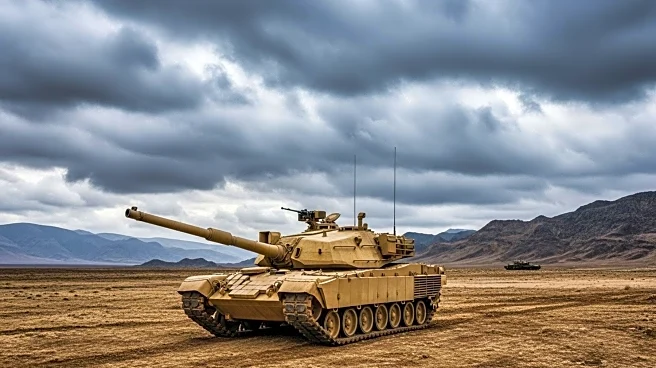What is the story about?
What's Happening?
North Korea recently celebrated the 80th anniversary of the Korean Workers’ Party with a grand display of military power, including a midnight parade showcasing its extensive arsenal. Under the leadership of Kim Jong-un, North Korea has heavily invested in military capabilities, including nuclear weapons and advanced missile systems. This focus on military strength has come at the expense of economic and social development, as the country struggles with limited fiscal resources and policy flexibility. Despite the impressive military might, experts warn that these investments hinder the potential for economic growth and improvement in living standards for North Korean citizens.
Why It's Important?
The emphasis on military power in North Korea has significant implications for regional security and international relations. By prioritizing military capabilities, North Korea poses a direct threat to neighboring countries, particularly South Korea, and challenges the U.S.-led international community. The military-industrial complex consumes a substantial portion of North Korea's GDP, limiting resources available for economic development. This focus on hard power over soft power prevents North Korea from engaging in global cultural, scientific, or technological exchanges, isolating the country further. The situation underscores the challenges of negotiating with North Korea, as its leadership remains committed to maintaining its nuclear arsenal.
What's Next?
North Korea's continued investment in military capabilities suggests ongoing regional tensions, particularly with South Korea and the United States. The potential for negotiation remains limited, as Kim Jong-un has publicly stated his refusal to denuclearize. However, North Korea may leverage its military assets for negotiation purposes, seeking sanctions relief or other concessions. The international community, including the U.N. Security Council, faces challenges in addressing North Korea's military ambitions while encouraging economic and social development. The situation requires careful diplomatic engagement to prevent escalation and promote stability in the region.
Beyond the Headlines
The focus on military power in North Korea highlights the ethical and humanitarian concerns associated with its governance. The regime's prioritization of military spending over economic development results in widespread poverty and limited access to basic services for its citizens. The lack of soft power and cultural exchange further isolates North Korea, preventing meaningful engagement with the global community. The situation raises questions about the long-term sustainability of North Korea's approach and the potential for systemic change, as internal and external pressures continue to mount.















